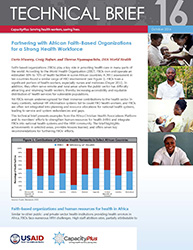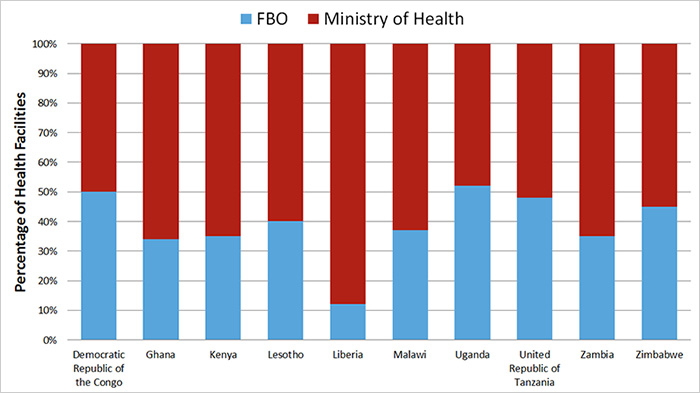October 2014
Doris Mwarey, Craig Hafner, and Theresa Nyamupachitu, IMA World Health
 Faith-based organizations (FBOs) play a key role in providing health care in many parts of the world. According to the World Health Organization (2007), FBOs own and operate an estimated 30% to 70% of health facilities in some African countries. A 2011 assessment in ten countries found a similar range of FBO involvement (see Figure 1). FBOs train a significant portion of health workers, especially nurses and midwives (Dwyer 2011). In addition, they often serve remote and rural areas where the public sector has difficulty attracting and retaining health workers, thereby increasing accessibility and equitable distribution of health services for vulnerable populations.
Faith-based organizations (FBOs) play a key role in providing health care in many parts of the world. According to the World Health Organization (2007), FBOs own and operate an estimated 30% to 70% of health facilities in some African countries. A 2011 assessment in ten countries found a similar range of FBO involvement (see Figure 1). FBOs train a significant portion of health workers, especially nurses and midwives (Dwyer 2011). In addition, they often serve remote and rural areas where the public sector has difficulty attracting and retaining health workers, thereby increasing accessibility and equitable distribution of health services for vulnerable populations.
Yet FBOs remain underrecognized for their immense contributions to the health sector. In many contexts, national HR information systems fail to count FBO health workers, and FBOs are often not integrated into planning and resource allocations for national health systems, leading to service and system redundancies and gaps.
This technical brief presents examples from the Africa Christian Health Associations Platform and its members’ efforts to strengthen human resources for health (HRH) and integrate FBOs into national health systems and the HRH community. The brief highlights achievements in selected areas, provides lessons learned, and offers seven key recommendations for furthering FBOs’ efforts.
Next >>
Figure 1: Contribution of Christian Health Networks in Select Countries in Africa

Source: Dimmock 2011
A printer-friendly version is available.